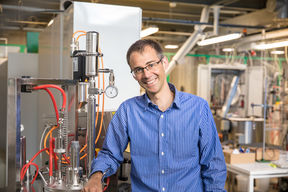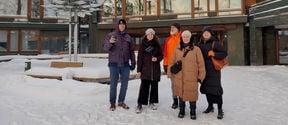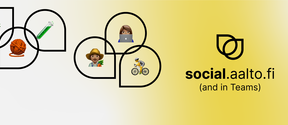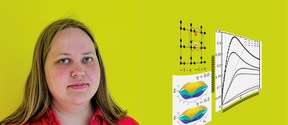Alexander Frey wants to cut health costs with specialised yeast

Alexander Frey thought over for a long time whether to do research in the industrial or academic spheres – and chose in the end the later because of the greater freedom it allows. Photo by Anni Hanén
Professor Alexander Frey, what do you research and why?
Together with my research group, I study how different kinds of products can be produced using customised forms of yeast. Yeasts are cheap and also robust organisms which can be used, for example, to produce biofuels. Many other organisms would die during the biofuel production process because of the high alcohol levels and poisonous compounds that form when processing the waste produced by the raw materials.
In addition to biofuels, we can also use yeasts in the manufacture of therapeutic proteins, meaning proteins used as medicines. Probably many people don’t know that insulin, for example, has been manufactured using yeast for thirty years already. Because yeast by nature produces only ethanol, adapting it to produce, for example, cancer-fighting anti-bodies is a very complicated process. It is essential, however, to find new medicine production methods, because health care expenses are growing all the time and society is not able to offer the best treatment and the newest medicines to all unless the costs are reduced.
What brought you to the field of research?
I didn’t really plan to have a career as a researcher. Towards the end of my studies, the practical courses and especially the work placements sparked my interest and got me thinking ‘yes, I want to do this’. But still, I thought over for a long time whether to do research in the industrial or academic spheres – and chose in the end the later because of the greater freedom it allows. In industry, narrow goals are normally set from above; in the university, you can choose for yourself the direction for your research based on what you think is important and interesting. Of course, there is also pressure here as well, but it mostly comes from oneself, not others.
What have been the highlights of your career?
One highlight was the confirmation of my professorship – it is, after all, an indication that a panel of external experts considers you to be doing excellent work.
Apart from this, it is hard to pick out individual highlights in work which I see as a continual process of development. It was a great moment, of course, when the first postgraduate student from my own research group defended their doctoral dissertation. There are also many rewarding moments in teaching as well, for example when students come forward to thank me for the project courses I have led.
What are the most important qualities for a researcher?
A researcher needs a strong will and a genuine interest in what they do – this can’t be learnt, it must be there at the outset.
You also need to be able to cope with frustration and setbacks, because doing research is not a smooth and straightforward task. Many experiments go wrong, but this isn't failure, it's learning.
What do you expect from the future?
The five-year fixed-term period before receiving my permanent professorship was a stressful time because I knew all the time that a certain amount of results were required in order to receive a permanent position. Now there is no need to be afraid, and instead my research group can focus on larger matters, which also involve larger risks. It’s great as well to be able to really establish myself, to be able to say that this is my research group’s specialist field and we are good in this field.
Alexander Frey and the other recently tenured professors at Aalto University will present their research in the multidisciplinary afternoon starting at 14.15 on 15 March. We hope to see you there!
See the lecture programme here
- Published:
- Updated:
Read more news

Preserving intangible cultural heritage through immersive XR experiences
Aalto University’s Department of Art and Media is coordinating a European wide project on preserving intangible cultural heritage and using it to address societal challenges with the help of immersive XR environments.
Find our doctoral community at Aalto Social
Follow the posts, share and discuss anything related to doctoral education at Aalto Social.Aalto computer scientists in CHI 2024
Ten papers from Aalto CS were accepted to the CHI 2024 conference